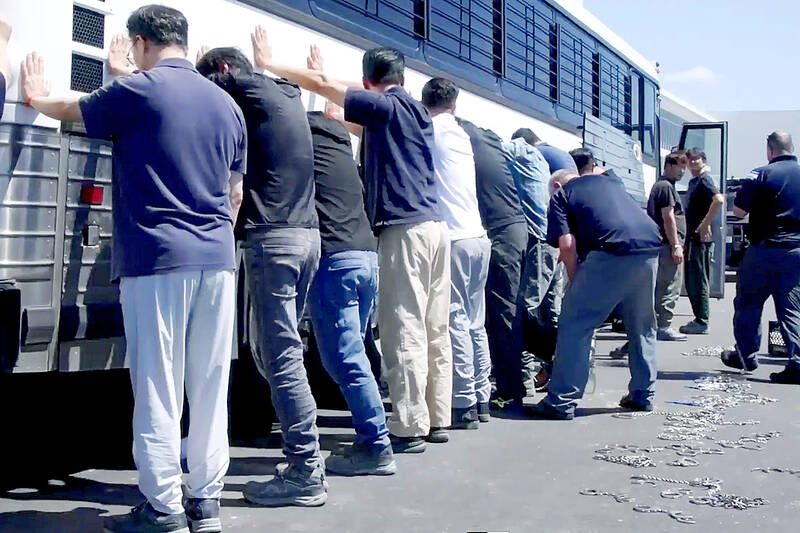South Korean Minister of Foreign Affairs Cho Hyun was to head to the US yesterday as he sought to resolve the fallout over the detention of hundreds of Korean workers during an immigration raid at a time when Seoul has committed to massive investment plans in the US.
Seoul on Sunday said that negotiations to arrange the release of about 300 Korean workers arrested at a Georgia battery plant being built by Hyundai Motor and LG Energy Solution (LGES) had concluded, and a plan is in the works to fly them home this week.
The detention of the workers by the US Department of Homeland Security agents sent shock waves through South Korea, a major US ally, which has been trying to finalize a US trade deal agreed in late July.

Photo: EPA
It came just 10 days after South Korean President Lee Jae-myung met with US President Donald Trump in Washington and the two pledged closer business ties.
Cho’s talks would center on bringing the Korean workers, who were mostly employed by subcontractors, home via a chartered plane in what would be called a “voluntary departure,” said a South Korean foreign ministry official who declined to give further details.
Cho told an emergency parliamentary hearing yesterday that the government expects to prevent workers from being hit with a five-year entry ban to the US, adding that negotiations were proceeding “well.”
He also said “a broad agreement has been reached” to ensure workers would not face further disadvantages when entering the US, although final confirmation was pending.
Cho said there had been some local discontent, citing how LG said it could not hire US workers until the plant was completed, a situation that “seems to have caused some dissatisfaction locally.”
The foreign minister also said he would meet with US Secretary of State Marco Rubio during his trip.
Trump, who has ramped up deportations nationwide as his administration cracks down on illegal immigrants, said last week that he had not been aware of the raid. He called those detained “illegal aliens.”
On Sunday, he called on foreign companies investing in the US to “respect our nation’s immigration laws,” but sounded more conciliatory.
“Your Investments are welcome, and we encourage you to LEGALLY bring your very smart people, with great technical talent, to build World Class products, and we will make it quickly and legally possible for you to do so,” he wrote on Truth Social.
The 300 South Koreans were among 475 arrested on Thursday at the site of a US$4.3 billion project by Hyundai and battery maker LGES to build batteries for electric cars. It was the largest single-site enforcement operation in the history of the US Department of Homeland Security’s investigative operations.
Seoul has expressed its unhappiness about the arrests and the public release of the footage showing the operation, which involved armored vehicles and the shackling of workers.
Hyundai Motor is one of the biggest foreign investors in the US and is among South Korean companies participating in the country’s pledge of a US$350 billion fund for the US market.
A Hyundai Motor spokesperson said some staff had been asked to suspend non-essential trips to the US.
LGES has also suspended staff business trips to the US, other than certain exceptional cases.

The combined effect of the monsoon, the outer rim of Typhoon Fengshen and a low-pressure system is expected to bring significant rainfall this week to various parts of the nation, the Central Weather Administration (CWA) said. The heaviest rain is expected to occur today and tomorrow, with torrential rain expected in Keelung’s north coast, Yilan and the mountainous regions of Taipei and New Taipei City, the CWA said. Rivers could rise rapidly, and residents should stay away from riverbanks and avoid going to the mountains or engaging in water activities, it said. Scattered showers are expected today in central and

People can preregister to receive their NT$10,000 (US$325) cash distributed from the central government on Nov. 5 after President William Lai (賴清德) yesterday signed the Special Budget for Strengthening Economic, Social and National Security Resilience, the Executive Yuan told a news conference last night. The special budget, passed by the Legislative Yuan on Friday last week with a cash handout budget of NT$236 billion, was officially submitted to the Executive Yuan and the Presidential Office yesterday afternoon. People can register through the official Web site at https://10000.gov.tw to have the funds deposited into their bank accounts, withdraw the funds at automated teller

COOPERATION: Taiwan is aligning closely with US strategic objectives on various matters, including China’s rare earths restrictions, the Ministry of Foreign Affairs said Taiwan could deal with China’s tightened export controls on rare earth metals by turning to “urban mining,” a researcher said yesterday. Rare earth metals, which are used in semiconductors and other electronic components, could be recovered from industrial or electronic waste to reduce reliance on imports, National Cheng Kung University Department of Resources Engineering professor Lee Cheng-han (李政翰) said. Despite their name, rare earth elements are not actually rare — their abundance in the Earth’s crust is relatively high, but they are dispersed, making extraction and refining energy-intensive and environmentally damaging, he said, adding that many countries have opted to

PEACE AND STABILITY: Maintaining the cross-strait ‘status quo’ has long been the government’s position, the Ministry of Foreign Affairs said Taiwan is committed to maintaining the cross-strait “status quo” and seeks no escalation of tensions, the Ministry of Foreign Affairs (MOFA) said yesterday, rebutting a Time magazine opinion piece that described President William Lai (賴清德) as a “reckless leader.” The article, titled “The US Must Beware of Taiwan’s Reckless Leader,” was written by Lyle Goldstein, director of the Asia Program at the Washington-based Defense Priorities think tank. Goldstein wrote that Taiwan is “the world’s most dangerous flashpoint” amid ongoing conflicts in the Middle East and Russia’s invasion of Ukraine. He said that the situation in the Taiwan Strait has become less stable